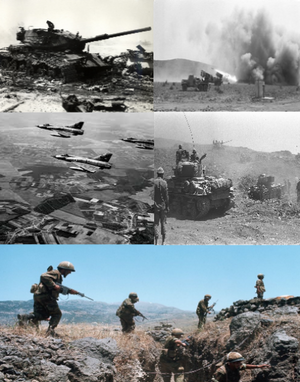Anniserian War
The Anniserian War was a military conflict between Nise, Sohar, and their respective allies over the disputed and oil-rich Urí Margidda Valley lasting between April 1963 and June 1967. Fighting took place throughout Nise, as well as in western Sohar. Both nations recieved significant international support, with Sohar recieving military support from Kirenia, East Miersa, and Behera, while Nise was backed by Estmere, Rizealand, and Paretia. The conflict began on April 13, when a Soharan force of XXX crossed into the Nise-controlled Urí Margidda Valley, which Sohar claimed control of, under orders to sieze oilfields in the area.
Although Nise had anticipated a Soharan offensive and had militarized the Urí Margidda, their forces were quickly overwhelmed by the advancing Soharan troops. Niserian King Nazim el-Salloum responded by immediately declaring war on Sohar; Kirenia and East Miersa responded by declaring war on Nise the following day, followed by Behera a week later. The Niserians were vastly outnumbered by the Soharan invasion force and were forced to abandon the Urí Margidda by February 1964. Although the disputed territory was now in Soharan hands, Soharan dictator Mazeed el-Farran was not satisfied, and ordered a full-scale invasion of Nise to "liberate the Anniserian people from their fascist-colonial occupiers." Under the command of General TBA, Soharan and allied troops began pouring into Nise and had conquered a large portion of the country by July 1964. Sohar's aggression prompted international outcry and caused Estmere, Rizealand, and Paretia to come to Nise's aid. In December 1964, the Estmerish Navy established a total naval blockade of Sohar with Rizealandish and Paretian support, crippling Sohar's economy, which was heavily dependent on oil exports.
With oil revenues rapidly drying up, Farran ordered the National Bank of Sohar to drastically increase the money supply to fund the war effort, resulting in the collapse in the value of the dinar. The inflation crisis led to a severe shortage of food by late 1965, and strikes and food riots swept Sohar during the winter of 1965-1966. After a violent uprising in Tarihi quickly overwhelmed local police, Farran ordered a redeployment of thousands of troops from the front lines to the cities to restore order, giving Nise and her allies a crucial opening to push back the Soharans. The Battle of City in May 1966 was a crucial turning point and gave Nise a foothold with which to retake the Urí Margidda. By November of that year, the Soharans were forced to abandon the region, and by early 1967, a combined force of Niserian, Estmerish, and Rizealandish troops had begun advancing into western Sohar. The Battle of Another City in late February was a crushing defeat for Sohar, and many of Farran's advisers urged him to sue for peace. Farran initially refused, believing the tide could still be reversed, but as Niserian troops began advancing on Tarihi directly, he finally capitulated on June 12, 1967.
The Anniserian War was a major watershed in Sohar's modern history. The country's defeat by Nise, a far smaller country, caused many in the socialist world to question Sohar's ability to serve as a bulwark for socialism in Rahelia and drove a rift between Farran and the military, who had formerly been his strongest supporters. Sohar's defeat also turned public opinion against the Soharan Section of the Workers' Internationale, who had govered the country since the 1951 revolution, leading to a failed uprising in 1972. The communist government's inability to defend the country also led to growing opposition to communism among the ranks of the military, culminating in the 1976 coup and the end of communist rule in Sohar.
